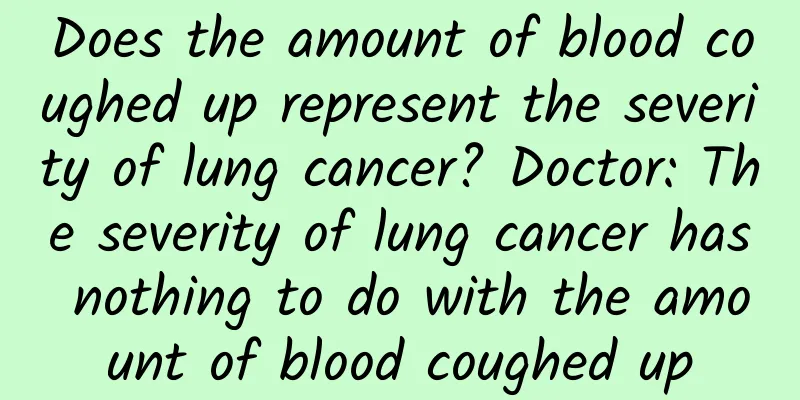Does the amount of blood coughed up represent the severity of lung cancer? Doctor: The severity of lung cancer has nothing to do with the amount of blood coughed up

|
Friends who like to watch romantic dramas must be very familiar with a scene. When the love between the hero and the heroine is about to come to fruition, the hero or the heroine coughs violently, and then there is a pool of blood on the handkerchief, and within a few days, he or she passes away tragically. Perhaps because they have watched too many TV dramas, or because Chinese people are too sensitive to physical bleeding, many lung cancer patients think that they are beyond help once they cough up blood, especially a large amount of blood. This is very wrong. There is no clear relationship between the severity of lung cancer and the amount of blood coughed up. Why do lung cancer patients cough up blood? Coughing up blood is a major feature of lung cancer. About 30% of lung cancer patients have coughing up blood as the first symptom. Among patients with advanced lung cancer, the number of patients coughing up blood is as high as 60%. When a tumor grows in the larger bronchus of the lungs, the tumor constantly stimulates the bronchial mucosa, and the body will cause a cough reflex in order to expel the "foreign body" from the body. Because the blood supply around the tumor is relatively rich, and the local blood vessels of the tumor are highly permeable, repeated coughing will cause bleeding around the tumor, and the blood will be coughed out of the body with the cough, which we call hemoptysis. In addition, as the tumor gradually grows, the tumor will compress the surrounding normal blood vessels, causing the normal blood vessels to rupture, thereby causing vascular bleeding. The blood stimulates the bronchial mucosa and causes the body to cough reflex, so the blood is coughed out of the body, which can also cause hemoptysis. Does the amount of coughed up blood have anything to do with the severity of cancer? Many lung cancer patients think they have advanced lung cancer once they cough up a lot of blood, which is very wrong. Hemoptysis is not an indicator of the severity of lung cancer. The most important factor that determines coughing up blood in lung cancer is the location of the tumor. For example, if a person's tumor grows around the lungs, away from the large bronchi, then the tumor may not irritate the main bronchial mucosa until the late stages, that is, it will not cause coughing or coughing up blood. If the tumor grows in the center of the lungs, the tumor will irritate the bronchial mucosa when it is very small, causing coughing and coughing up blood. Therefore, coughing up blood and the amount of coughed up blood are not necessarily related to the severity of cancer, but are more related to the location of tumor growth. Does coughing up blood mean lung cancer is diagnosed? In fact, in addition to lung cancer, there are many diseases that can cause coughing up blood. The following are common diseases Bronchial diseases: common in bronchiectasis, bronchial tuberculosis, chronic bronchitis, etc., which cause blood vessel rupture and cause coughing up blood. Lung disease: common in tuberculosis and pneumonia, which causes increased capillary permeability and leads to hemoptysis. Blood system diseases: For example, when there is thrombocytopenia, thrombocytopenic purpura, and poor coagulation function, the human body is prone to bleeding, resulting in coughing up blood. How to treat coughing up blood caused by lung cancer? 1. Treatment of the primary disease: The coughing up blood of lung cancer patients is ultimately related to the primary lung cancer, so treating the primary disease is the most effective way. Whether to choose surgical resection or radiotherapy and chemotherapy depends on the type of tumor and the patient's physical condition. 2. Hemostatic treatment: When the patient has a large amount of bleeding, appropriate hemostatic drugs should be used. Commonly used ones include hemostatic enzymes, cyclohexane acid, etc. Posterior pituitary hormone can be used when the amount of hemoptysis is large. 3. Posture treatment: Patients with hemoptysis should lie flat with their heads tilted to one side to facilitate the coughing out of the blood. To prevent suffocation, sitting up to cough up blood is absolutely forbidden. Summary: Hemoptysis is one of the common clinical symptoms of lung cancer. Hemoptysis in lung cancer is related to the location of the tumor, but not necessarily to the severity of the tumor. When lung cancer causes hemoptysis, the primary disease must be actively treated. When the amount of bleeding is large, the correct body position must be selected and hemostatic treatment must be given. |
<<: What animal's feathers are used for badminton? Which country did badminton originate from?
>>: Are you still worried about acne?
Recommend
What are the criteria for evaluating high-quality ground-based APP task-taking platforms in 2023?
When it comes to high-quality ground-promotion AP...
Can I continue breastfeeding if I have mastitis?
Many people think that as long as the baby is bor...
What is the meaning of the fortune tree? Will the fortune tree bloom?
The fortune tree is a potted plant of the evergre...
Leucorrhea with stringy discharge will definitely indicate menstruation
Many women experience physical discomfort before ...
How to take care of cervical erosion
In recent years, the incidence of cervical erosio...
Treatment for blocked breast
People will feel very uncomfortable when the brea...
How many injections of insulin should pregnant women take per day
Many people may think that diabetes mainly occurs...
Acupuncture points for breastfeeding
Soon after birth, babies need to eat breast milk ...
The four best ways for women to treat back pain
Low back pain is a very common disease, especiall...
What female hormones are you taking?
What is estrogen? What are the female hormones? I...
Acne on the back during pregnancy means it's a boy
Pregnancy is very important to the family, especi...
What can vaginal B-ultrasound check?
Vaginal B-ultrasound mainly uses a colposcopy to ...
What is the appropriate water temperature for pregnant women to take a bath
What is the appropriate water temperature for pre...
How much does it cost to test ovulation with B-ultrasound?
Ovulation is a physiological phenomenon that occu...
Why does vaginal itching occur one month after delivery?
Mothers often have vaginal discharge after giving...









